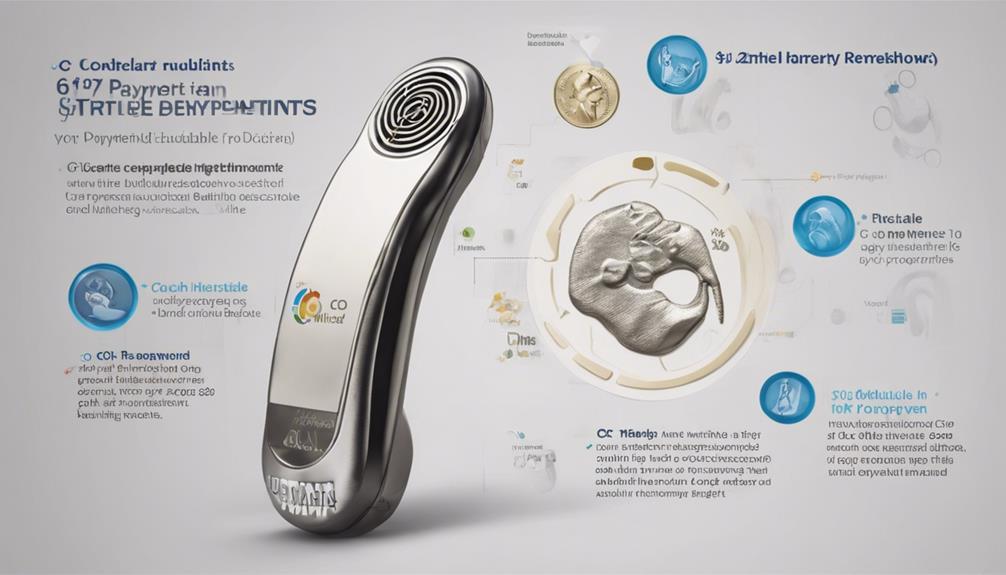When it comes to understanding healthcare insurance, it is essential to fully grasp how United Healthcare covers cochlear implants, as this knowledge is crucial in obtaining important medical treatments.
From eligibility requirements to navigating the pre-authorization process, each aspect plays a significant role in determining the extent of coverage individuals may receive.
By exploring the nuances of in-network versus out-of-network providers and considering co-payment and deductible implications, we can unravel the intricacies of this coverage.
Join us as we uncover the step-by-step guide to United Healthcare's approach to cochlear implant coverage and empower ourselves with valuable insights into this vital healthcare offering.
Key Takeaways
- United Healthcare covers cochlear implants for adults with Single-Sided Deafness (SSD) over 18.
- Pre-authorization process requires submission of clinical documentation for coverage validation.
- Opting for in-network providers reduces out-of-pocket costs for cochlear implant services.
- Prompt appeals process with detailed documentation is crucial for denied claims resolution.
Eligibility Requirements for Cochlear Implant Coverage
When seeking coverage for cochlear implants through United Healthcare, individuals must meet specific eligibility requirements, including age and diagnosis criteria. United Healthcare now covers cochlear implants for adults over 18 with Single-Sided Deafness (SSD) starting January 1, 2023.
However, children under 5 are excluded from this coverage. It's crucial for individuals to meet the eligibility criteria for SSD and be above 18 years old to qualify for United Healthcare's cochlear implant coverage.
This change in policy by United Healthcare has significant implications for access to this intervention, particularly for specific age groups and demographics. It's essential for individuals to understand these coverage criteria to navigate the process effectively.
Understanding United Healthcare's Pre-Authorization Process

To initiate the process of obtaining coverage for cochlear implant surgery through United Healthcare, it's imperative to understand and adhere to their pre-authorization requirements. When navigating United Healthcare's pre-authorization process for cochlear implant surgery, it's crucial to consider the following:
- Submission of Clinical Documentation: Providing detailed clinical documentation, including the patient's medical history and the necessity for cochlear implant surgery, is essential.
- Review Process by United Healthcare: United Healthcare evaluates the pre-authorization request to determine coverage eligibility based on their specific policy guidelines.
- Ensuring Medical Necessity: The pre-authorization process helps ensure that the cochlear implant surgery is medically necessary and meets United Healthcare's criteria for coverage.
- Navigating Insurance Coverage: Understanding and following United Healthcare's pre-authorization process is key to effectively navigating insurance coverage for cochlear implants.
- Importance of Clinical Documentation: Accurate and comprehensive clinical documentation plays a significant role in the pre-authorization process for medical services and procedures like cochlear implant surgery.
In-Network Vs. Out-Of-Network Providers: Impact on Coverage
Understanding the impact of choosing in-network or out-of-network providers on coverage for cochlear implants under United Healthcare is crucial for individuals navigating their insurance policies. In the United States, United Healthcare, the largest US insurance company, covers SSD in adults with cochlear implants. However, there are specific considerations regarding network providers.
Opting for in-network providers usually results in lower out-of-pocket costs, maximizing insurance benefits and reducing financial strain. On the other hand, out-of-network providers may lead to higher expenses or limited coverage, affecting reimbursement rates and coverage levels.
While United Healthcare has made strides by covering SSD in adults with cochlear implants, it continues to exclude coverage for certain cases. Thus, individuals must carefully review network restrictions to ensure comprehensive coverage. Being informed about the differences between in-network and out-of-network providers is essential for those seeking cochlear implant coverage through United Healthcare.
Co-Payment and Deductible Considerations

Navigating the co-payment and deductible considerations for cochlear implant procedures under United Healthcare requires careful attention to the specific plan and coverage details. Understanding the co-payment structure and deductible requirements is crucial for planning and budgeting for cochlear implant surgery.
Here are some key points to consider:
- Co-payments for cochlear implant procedures can vary based on the specific plan and coverage details.
- Patients may need to meet their deductible before United Healthcare covers a portion or all of the cochlear implant costs.
- Some United Healthcare plans may offer lower co-payments or deductibles for in-network providers specializing in cochlear implantation.
- Checking with United Healthcare directly or reviewing the policy details can provide specific information on co-payment and deductible considerations for cochlear implants.
- Changes in coverage details or a new policy may affect co-payment and deductible requirements for cochlear implant procedures.
Appeals Process for Denied Claims
When dealing with denied claims under United Healthcare, it's crucial to promptly initiate the appeals process by submitting a formal written request for review. Appeals must be made within a specified timeframe following the denial notification.
It's essential to include supporting documentation such as medical records, provider notes, and test results to strengthen the appeal. United Healthcare will conduct a thorough review, carefully considering all the information provided before making a final determination.
If the appeal is denied again, further actions may be taken, including pursuing an external review or seeking legal assistance to challenge the decision. It's important to follow the appeals process diligently and provide all necessary information to increase the chances of a successful outcome.
Remember that challenging a denial requires attention to detail and persistence in advocating for the coverage deserved.
Frequently Asked Questions
What Brand of Hearing Aid Does Unitedhealthcare Use?
We don't cover hearing aids, but we do cover cochlear implants for severe to profound hearing loss.
Various brands like Cochlear, Advanced Bionics, and Med-El may be included, depending on policy specifics.
Our coverage is based on medical necessity and professional evaluations. For details on the brand of cochlear implants covered, please contact us directly or refer to your policy documents.
We prioritize providing comprehensive information to assist you.
What Are Unitedhealthcare Hearing Benefits 2023?
Our hearing benefits for 2023 at United Healthcare include coverage for various hearing aids, evaluations, and fittings. These benefits aim to support our members in improving their hearing health and overall quality of life.
We prioritize providing comprehensive and accessible services to meet the diverse needs of our members. Our commitment to enhancing hearing care ensures that individuals can access the support they need for better hearing outcomes.
Conclusion
As we navigate the complex world of healthcare coverage for cochlear implants, it's clear that United Healthcare's policy changes have both positive and negative impacts.
While some may face challenges with eligibility requirements and provider options, there's hope in the appeals process for denied claims.
Let's continue to advocate for improved access to cochlear implants, ensuring that all individuals have the opportunity to hear the world around them.










